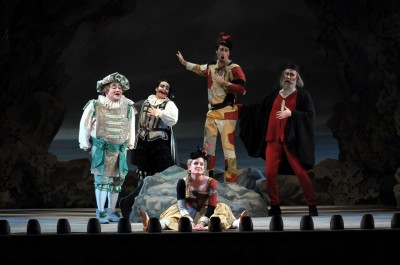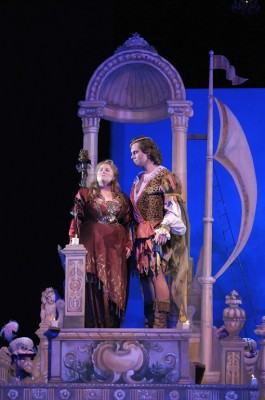Ariadne auf Naxos
Composed by Richard Strauss
Libretto by Hugo von Hofmannsthal
Conducted by Sir Andrew Davis
Directed by John Cox
At the Lyric Opera, Chicago
O, you boy, you child, you almighty god!
Ariadne auf Naxos is anything but a typical opera. It is in one act with a prologue and is relatively on the short side. The prologue is actually set back stage of the opera in a Viennese noble’s house; it is he who is patronizing the opera, putting it on in his house after dinner, to be followed by an Italian opera buffo troupe and then fireworks.
 Really what this opera is, is Richard Strauss showing off: he is demonstrating his handle of the history of opera, his handle of the various styles of opera and his ability to imitate them, as well as his general compositional virtuosity – which he always does. The “opera proper,” so to speak – that is, the Ariadne auf Naxos that is to be performed in the noble’s home – is very serious, filled with moralizing and tragedy and emotion; which is to say, rather Wagnerian. And the Italian opera troupe is to perform “Zerbinetta and her Four Lovers,” a typical buffo with stock characters; that is, very Italian, but also with a nod to Mozart.
Really what this opera is, is Richard Strauss showing off: he is demonstrating his handle of the history of opera, his handle of the various styles of opera and his ability to imitate them, as well as his general compositional virtuosity – which he always does. The “opera proper,” so to speak – that is, the Ariadne auf Naxos that is to be performed in the noble’s home – is very serious, filled with moralizing and tragedy and emotion; which is to say, rather Wagnerian. And the Italian opera troupe is to perform “Zerbinetta and her Four Lovers,” a typical buffo with stock characters; that is, very Italian, but also with a nod to Mozart.  Well, the noble has decided – as the uncultured superrich so often do – to change things at the last minute to suit his whims, and has come up with something wholly unreasonable: both pieces are to be performed simultaneously, and perfectly timed to end coinciding with the beginning of the fireworks (at 9:30, precisely). This sends the Composer (Alice Coote) into a tizzy, but he is calmed down by the clever Zerbinetta (Anna Christy), who assures him all art goes through trials like this, and whose comic troupe is used to improvising. The Composer – all too late – has also been inspired and composed a new line, a beautiful, soaring melody: “O du Knabe, du Kind, du allmächtiger Gott!” (which is really just Strauss showing off). And so, after an intermission, the opera begins.
Well, the noble has decided – as the uncultured superrich so often do – to change things at the last minute to suit his whims, and has come up with something wholly unreasonable: both pieces are to be performed simultaneously, and perfectly timed to end coinciding with the beginning of the fireworks (at 9:30, precisely). This sends the Composer (Alice Coote) into a tizzy, but he is calmed down by the clever Zerbinetta (Anna Christy), who assures him all art goes through trials like this, and whose comic troupe is used to improvising. The Composer – all too late – has also been inspired and composed a new line, a beautiful, soaring melody: “O du Knabe, du Kind, du allmächtiger Gott!” (which is really just Strauss showing off). And so, after an intermission, the opera begins.
Ariadne is stranded on an island, wishing only for death. Three Nymphs try to protect her and cheer her, but they are unable; despair and desolation are sinking in. It is at this time that Zerbinetta and her four lovers land on the island, determined to cheer Ariadne up – to no avail. Zerbinetta, in a classic and absolutely magnificent tour de force aria, Großmächtige Prinzessin, attempts to enliven Ariadne by pointing out that all women suffer the same fate under men, and so one must simply allow several to pursue you at once, thereby undermining the game they play. It is amazing the depths of sorrow she expresses, and how she transforms that into great joy.  She, too, is unsuccessful, however, at moving Ariadne; and so she instead begins her own story of the Four Lovers, a very light piece yet very studied – that is, Strauss composes in the style of the comic opera exactly. Afterwards, Bacchus arrives, having escaped Circe, and falls in love with Ariadne. He realizes the extent of his deific powers because of her, and they sail off together, happy.
She, too, is unsuccessful, however, at moving Ariadne; and so she instead begins her own story of the Four Lovers, a very light piece yet very studied – that is, Strauss composes in the style of the comic opera exactly. Afterwards, Bacchus arrives, having escaped Circe, and falls in love with Ariadne. He realizes the extent of his deific powers because of her, and they sail off together, happy.
The story of Ariadne mirrors the theme of the overall play: namely, that when comedy is set side-by-side with tragedy, it will win; if Mozart were to face Wagner, Mozart would triumph simply by default; and Dionysus will prevail. Strauss surely had the Apollonian and Dionysian dichotomy in mind when he wrote this piece – after all, he is the composer of Also Sprach Zarathustra – and it shows. There is such interplay between comedy and tragedy – two sides of the same Dionysian coin – and between Apollonian form and structure and Dionysian chaos. Strauss’ Ariadne is far from a typical opera, and far from typical Strauss: it has a fairly small orchestra, closer to what Mozart would use than Wagner. It is light and airy and jokey, but it is also an intellectual piece, a satire that makes fun of overserious opera, of the very wealthy, of the self-absorbed composer. It is a rich and wonderful work, and the Lyric presents it with deft direction, beautiful sets and costumes, and excellent execution.
Highly Recommended
Will Fink
Reviewed on 11.22
For full show information, visit TheatreInChicago.
At the Lyric Opera, 20 N. Wacker Drive, Chicago, IL; call 312-332-2244, www.lyricopera.org; tickets $34-$239, through Dec. 11, 2011. Running time is 2 1/2 hours.

